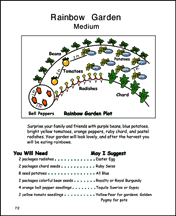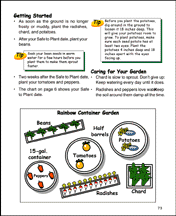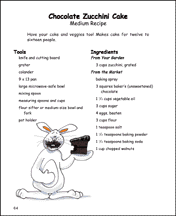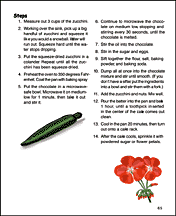|
Table of Contents
for Grow Your Own Pizza
Introduction
Tips for the Garden and Kitchen
Follow the Garden Path to Grow Your Own Feast
Easy Garden Plots
Spring Salad Bowl Garden
Leaves and Flowers Salad
Chive Blossom Dressing
Queen Margherita’s Pizza Garden
Queen Margherita’s Pizza
Peas ‘n’ Carrots ‘n’ Garden
Peas ‘n’ Carrots ‘n’ Honey
Carrots Stuffed with Spinach Souffle
Sassy Seed Snacks Garden
Popcorn
Two Seeds Four Ways
Be-Kind-to-Animals Garden
Flea Chaser
Catnip Toy
Sunflower Snackers
Lizard Lettuce
Salsa Garden
Mild Garden Salsa
Spot-‘o’-Tea Garden
Mint Tea
Cucumber or Radish Sandwiches
Grow-in-the-Dark Garden
Yeast in a Deep, Dark Bowl
Best Bread
Sprout Spread Head
Medium Garden Plots
Be-Berry-Patient Patch
Berries in a Muffin
Strawberry Punch
Corn Crop Circles Garden
Cobs and Cobs and Cobs of Corn
Your Personal Pizza Garden
One Pizza Twelve Ways
Superfoods Garden
Broccoli Trees Under a Green Cheese Moon
Cake and Ice Cream Garden
Chocolate Zucchini Cake
Peppermint Ice Cream
Rose-Scented Geranium Cake with Lavender Ice Cream
Pickles ‘n’ Peppers Garden
Dill Pickles ‘n’ Peppers
Rainbow Garden
Colorful Crunchers
Rancher Dressing
Blue and Gold Potato Cakes
Savory Herb Garden
Many Uses for Savory Herbs
Advanced Garden Plots
Three Sisters Native American Garden
Three Sisters Supper
Stir Fry Garden
Garden Lo Mein
It’s-Not-Spaghetti Garden
It’s-Not-Pasta Primavera
Basil Bob’s Vegetable Garden
Basil Bob’s 1-cup Vegetable Soup
The A-maze-ing, Never-Ending Salad Garden
The Never-Ending Salad Bar
I’m Dreaming of a ____ Garden
Green Thumb Guide
Compost 1-2-3
Garden Tea
Tips for Growing Tomatoes by the Ton
Glossary
Bibliography
Index
back to Grow Your Own Pizza

Excerpt
from Grow Your Own Pizza
Rainbow Garden
 
Surprise your family and friends with purple beans, blue potatoes, bright
yellow tomatoes, orange peppers, ruby chard, and pastel radishes. Your garden will look lovely, and after the harvest you will be eating rainbows!

Chocolate Zucchini Cake
Have your cake and veggies too! Makes cake for 12 to 16 people.
 
Tools:
- knife and cutting board
- grater
- colander
- 9 x 13 pan
- large microwave-safe bowl
- mixing spoon
- measuring spoons and cups
- flour sifter or medium-size bowl and fork
- pot holder
Ingredients:
- From Your Garden:
- 3 cups zucchini, grated
- From the Market:
- baking spray
- 3 squares baker’s (unsweetened) chocolate
- 1-1/2 c. vegetable oil
- 3 c. sugar
- 4 eggs, beaten
- 3 c. flour
- 1 tsp. salt
- 1-1/2 tsp. baking powder
- 1-1/2 tsp. baking soda
- 1 c. chopped walnuts
Steps:
- Measure out 3 cups of the zucchini.
- Working over the sink, pick up a big handful of zucchini and squeeze it
like you would a snowball. Water will run out. Squeeze hard until the water stops dripping.
- Put the squeeze-dried zucchini in a colander. Repeat until all the zucchini has been squeeze-dried.
- Preheat the oven to 350 degrees Fahrenheit. Coat the pan with baking spray.
- Put the chocolate in a microwave-safe bowl. Microwave it on medium-low for 1 minute, then take it out and stir it.
- Continue to microwave the chocolate on medium low, stopping and stirring every 30 seconds, until the chocolate is melted.
- Stir the oil into the chocolate.
- Stir in the sugar and eggs.
- Sift together the flour, salt, baking powder, and baking soda.
- Dump all at once into the chocolate mixture and stir until smooth. (If
you don’t have a sifter, put the ingredients into a bowl and stir them with a fork.)
- Add the zucchini and nuts. Mix well.
- Pour the batter into the pan and bake 1 hour, until a toothpick inserted in the center of the cake comes out clean.
- Cool the pan 20 minutes, then turn out onto a cake rack.
- After the cake cools, sprinkle it with powdered sugar or flower petals.
back to Grow Your Own Pizza

Curriculum Based Activity
for Grow Your Own Pizza
Summer Activities:
Try these this summer!
Wading into Gardening
If you are just getting started, and you don’t want to dive right in…wade in!
- Buy an inflatable, child-size wading pool.
- Fill it with good soil mix. (Page 108 of Grow Your Own Pizza tells
you how to make your own soil mix. Garden soil won’t do for this kind of garden container.)
- Plant shallow-growing plants in the pool. Radishes, short carrots,
lettuce and small flowers like pansies are good. Avoid big plants like corn, tomatoes or squash.
- Tend your garden! You will get a good crop--and when summer is over, you can dump the dirt and fold up your garden!

Gardening News
Create a weekly, one-page newspaper about your garden. Write about
- the day you planted the garden
- people who have helped you with your garden
- weekly updates on weather and watering
- welcome and not-so-welcome visitors: worms, bugs, birds. See page 118-121 of Grow Your Own Pizza for help with bugs.
- a “true crime” story about weeds
- trivia (see the quiz)
- games, puzzles, and riddles
- recipes
- craft ideas
- photographs or drawings
You can find fun facts about plants online, in encyclopedias, or in special books like Cucumber Soup.
Hang your newspaper on the refrigerator, where everyone can read it.

Play Crows in the Corn
You need at least 11 people to play this game of tag.
- Pick one person to be the crow and one person to be the farmer. They stand aside.
- Nine people line up in three rows of three. You are the corn field. Hold hands with the people standing beside you.
- The crow starts running through the cornfield, and the farmer chases the crow.
- Whenever the scarecrow yells “Crow in the cornfield!” everyone in the
cornfield drops hands, turns to the left, and grabs hands with their new neighbors.
- When the farmer catches the crow, the farmer picks a scarecrow and the crow picks a new crow and the game continues.

Guest Book
- Keep track of the visitors you find in your garden. Make a booklet, with one page for each visitor.
- Write down what it is (aphid, earthworm, slug, bee, robin, crow, raccoon).
- Draw a picture or take a photograph of it.
- Describe it in words. Even if it is not a nice visitor, it may still be pretty or interesting to look at.
- Write whether the visitor is good or bad for your plants and why.
- If it is a bad visitor, write down what you did to protect your plants.

Random Acts of Beauty
Brighten up your neighborhood with random acts of beauty. You won’t believe
how well some flowers will grow in odd, vacant places. Carry some flower seeds in your pockets, and drop them in the cracks of sidewalks. Before long, you will have flowers!
If you live in a dry area, plant portulaca (moss rose). If you live in an area that gets rain all summer, plant alyssum.

Garden Party
Invite your friends over for a day in the garden. They can help you weed and
feed and water your plants. After working, have snacks! Try Berries in a Muffin (page 48), Cucumber or Radish Sandwiches (page 41), Mint Tea (page 40) or Chocolate Cake with Peppermint Ice Cream (pages 64-66) in
Grow Your Own Pizza.

Time-Lapse Photos
- Take a picture of your garden once a week, starting the day you plant.
- Mount the pictures in a long row on a sheet of butcher paper.
- Under each picture write the date and something interesting about the garden.
- At the end of the summer, you will have a timeline of your garden!
Hint: You can do this, even if you have only one or two plants.

Did You Know?
- The first pizzas were just chunks of bread topped with whatever was handy.
- The toppings of a classic pizza--tomatoes, basil and mozzarella cheese--represent the colors of the Italian flag.
- Lavender is a natural flea repellant.
- Salsa means “sauce” in Spanish.
- Most gardens need full sun every day to grow strong. But two plants--yeast and sprouts--grow in the dark.
- Broccoli, carrots, and onions are so good for you that scientists call them Superfoods.
- Rose scented geraniums, lavender and basil make great flavoring for ice cream.
- In China, noodles are traditionally served on birthdays. The long noodles symbolize long life.
- Soak big hard seeds, like peas or corn, in warm water for an hour or so before you plant, to make them sprout faster.
- Anything that will hold dirt and water will hold a plant. Try an old
bathtub, four stacked-up tires, a laundry basket lined with a garbage bag, or even a baby carriage!
- If your yard doesn’t have a garden space, tuck your plants in flower beds or use containers

 Curriculum Connection Curriculum Connection
for Grow Your Own Pizza
Observe the Herb
Resources needed:
- Several sprigs of one kind of herb: Dill, rosemary, and mint are good.
- Large sheet of white paper.
- Pen
Directions:
- Distribute several sprigs of herbs among the students.
- Encourage students to pass the herbs around and examine the herbs using all of their senses.
- As students examine the herbs, they call out words to describe it.
- Write the words on the sheet of paper.
- Ask leading questions like, “If this smell were a color, what color would
it be?” “What does the shape remind you of?” (Dill may remind students of feathers, rosemary of pine needles.)
- When you have a good number of words on the paper, step back and read them together as a group.
- Ask students to name the herb. Write their suggestions across the top of the paper.
- Write the real name of the herb across the bottom of the paper.
- Tape the sprigs of herb in any blank space on the paper.
Follow up:
Encourage students to find out:
- How did this herb get its name?
- Why do plants have Latin names? Whose idea was that?

Compost Comparison
Make two compost heaps to see how a “good” compost heap compares with a typical landfill.
- Read the instructions for making compost on pages 122-123 of Grow Your Own Pizza.
- Talk with students about what should and should not go in a compost heap--and why.
- In one large group, have students call out suggestions to generate two lists--good stuff and bad stuff.
- Invite students to bring in materials to contribute to your class compost heaps. They may bring in good stuff and/or bad stuff.
Good stuff: dirt, grass clippings, leaves, very small
twigs, fresh vegetable scraps.
Bad stuff: aluminum foil, packing peanuts or
Styrofoam, plastic bottles, pop cans.
Hint: Teacher should bring in bagged manure.
- Make a good compost heap. It doesn’t need to be large. Follow the directions on pages 122-123 of Grow Your Own Pizza.
- Make a bad compost heap. Pile up all the bad stuff and cover it with
grass clippings, then dirt. Don’t water it or stir it. Just let it sit.
- At the end of two or three months, tear the piles apart and compare what you find.

Wise Gardeners
- “Patience is a virtue” is a proverb. Why is patience important for gardeners?
- What other proverbs or mottoes do you already know about gardening or plants?
- As you garden, keep track of what you have learned by writing your own proverbs or mottoes.
- On a sheet of paper, write the motto in fancy, colorful letters, then write
a few sentences explaining how you learned this lesson and why it is important for gardeners to know.
back to Grow Your Own Pizza

Reviews
of Grow Your Own Pizza
“Grow Your Own Pizza by Constance Hardesty is a book full of gardening
practices, plans, and child-friendly recipes. It covers planning, soil preparation, planting, transplanting, harvesting, cooking, cultural requirements
for many types of vegetables and loads of other how-to information. Hardesty presents the lore in a way that will interest children, such as her stir-fry,
savory herb and cake-and-ice-cream gardens. The author is an instructor and trainer at the Denver Botanic Garden, where she creates and leads children’s tours.”
—Washington Post April 23, 2001
The next time someone is hungry for a pizza, don’t order one, grow one!
Constance Hardesty, an instructor and trainer at the Denver Botanic Gardens, has organized with clarity and simplicity her appropriately titled book.
Organized by “Easy,” “Medium,” and “Advanced” garden plots, this handy resource enables blossoming gardeners and aspiring chefs to progress to
more advanced creations as their skills are refined. For gardeners and food connoisseurs of all ages, this fun, yet practical, resource will take you
step-by-step from dirt to dinner table. Safety tips for the garden and kitchen, a glossary, and full-color illustrations are included.
—Colorado Homes & Lifestyles Magazine
back to Grow Your Own Pizza
|
|









 Curriculum Connection
Curriculum Connection